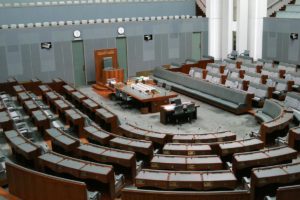Australians disenchanted with politics – Scanlon Report
The paralysis and poor quality of Australia’s political system and the dysfunction of its politicians is a major national issue, according to new research that taps in to what Australians think.
The Mapping Social Cohesion survey conducted by the Scanlon Foundation and Monash University reported a record low level of trust in federal parliament and the political system.
It found the quality of government and parliament second only to the economy and unemployment as the major challenge the nation faces.
As many as 31 per cent of respondents to the survey said major change was needed to fix the political system – up from 11 per cent in 2014.
 The survey’s author, Professor Andrew Markus, said the state of Australia’s democracy was a major focus of public discussion.
The survey’s author, Professor Andrew Markus, said the state of Australia’s democracy was a major focus of public discussion.
“There is a widespread view that the political system lacks the ability to deliver on public policy,” Prof Markus said.
He said that parliament had failed to legislate on a range of policies that had broad public support.
The survey found that 83 per cent of people supported the introduction of prescribed medical marijuana as a painkiller, 80 per cent were in favour of medically approved euthanasia, 70 per cent wanted a reduction in reliance on coal for electricity and 67 per cent wanted marriage equality for same sex couples.
“The lack of trust in the political system may in part reflect the failure to address issues supported by a majority of electors and the failure to pass legislation that has widespread public support,” Prof Markus said.
He said that confidence in Australia’s political system plummeted in 2010 under the Prime Ministership of Kevin Rudd and had not recovered.
“There was an expectation that in 2014, following the election of the Abbott government, there would be significant increase in the level of trust (in parliament),” Prof Markus said.
“This expectation was not realised. While the level of trust increased, it was only by three percentage points,” he said.
The survey found that 35 per cent of people expressed “little interest” in this year federal election campaign.
Asked how often the government in Canberra could be trusted to do the right thing for the Australian people, 67 per cent answered ‘only some of the time’ or ‘almost never’ while only 29 per cent answered either ‘almost always’ or ‘most of the time’.
“I think the survey tells us more about the political system than it does about migration and cultural diversity,” he said.
“If we don’t do a better job of governing the country, we won’t be equipped to deal with any shocks into the future.
“Maybe it’s not about getting the right type of immigration policy and the right type of immigrants, maybe it’s about getting the right sort of politicians,” Prof Markus said.
He said the 2016 survey was conducted at a time when a number of political commentators pointed to a significant shift in public opinion which amounted to a revolt against political elites.
“Within Europe and the United States the interpretation is supported by the British vote to leave the European Union, the increasing popularity of far-right parties campaigning on anti-immigration and nationalist platforms, and the success of Donald Trump in winning the Presidency,” Prof Markus said.
He said that in Australia, commentators had pointed to instability in politics, election results which fail to return clear majorities, the loss of office of first term governments in Queensland and Victoria, and the number of minor parties that have won representation in the Australian Senate, including One Nation.
But Prof Markus concluded that unlike in the US and Europe the overall picture showed more evidence of stability and cohesion than of deterioration.
“Given we are living an unstable, volatile political environment, there is cause of some concern,” he said.
“Our politicians have not built up trust which leaves us susceptible in the event of a major shock – such as a mass terror event – to significant political and social turmoil,” Prof Markus said.
Laurie Nowell
AMES Australia Senior Journalist













